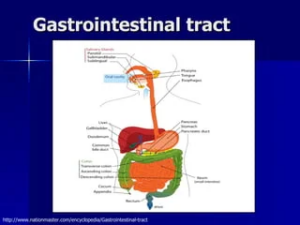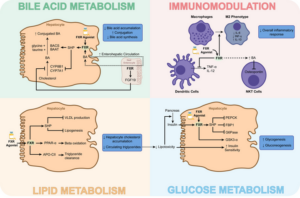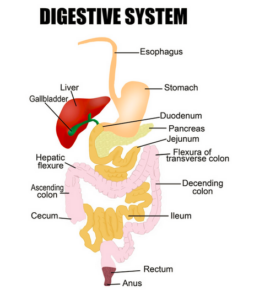NURS 6521 Week 4: Pharmacotherapy for Gastrointestinal and Hepatobiliary Disorders
 Introduction to the Case: In this paper, we discuss the case of a patient, HL, who is dealing with both gastroenteritis and liver issues.
Introduction to the Case: In this paper, we discuss the case of a patient, HL, who is dealing with both gastroenteritis and liver issues.
HL is currently experiencing symptoms like nausea, vomiting, and diarrhea, which suggest an underlying gastrointestinal infection.
Given the patient’s medical history, including drug misuse, there is a concern that HL might have Hepatitis C, which could complicate the overall diagnosis.
The patient is currently on medications including Synthroid, Nifedipine, and Prednisone, which are important to consider in managing their condition.
Diagnosis: Gastroenteritis and Hepatitis C
HL’s primary diagnosis would be gastroenteritis, an infection that affects the stomach and intestines, leading to symptoms such as vomiting, diarrhea, abdominal cramps, and fever. Gastroenteritis can be caused by various viruses, bacteria, or parasites, with norovirus gastroenteritis being one of the most common viral causes. In HL’s case, the symptoms strongly point to a viral gastroenteritis, likely caused by norovirus, which is easily spread through contaminated food, water, or direct contact. Additionally, HL’s medical history raises concerns about Hepatitis C (HCV), as this viral infection can lead to chronic liver disease, which may complicate the treatment and management of gastroenteritis.

Struggling to meet your deadline?
Get your assignment on NURS 6521 Week 4: Pharmacotherapy for Gastrointestinal and Hepatobiliary Disorders done by certified MDs and PhDs in the USA. ORDER NOW!
Impact of Prednisone on Liver Function
An important consideration in HL’s case is the use of Prednisone, a corticosteroid that can have significant effects on liver function. Prednisone is metabolized in the liver, and prolonged use can lead to changes in liver enzymes, potentially worsening liver disease. For patients with chronic liver disease management or Hepatitis C, the use of prednisone can exacerbate liver damage and increase viral replication. Prednisone’s impact on liver function is a critical concern in HL’s treatment, as it can influence both the severity of gastroenteritis symptoms and the progression of liver disease.
Symptom Management and Treatment Plan
To manage HL’s gastroenteritis symptoms, the primary focus should be on hydration and alleviating nausea and vomiting. Hydration in gastroenteritis is crucial, as dehydration from vomiting and diarrhea can worsen the condition. Small sips of water, clear broths, or oral rehydration solutions should be encouraged to maintain fluid and electrolyte balance. For nausea and vomiting, antiemetics for gastroenteritis, such as ondansetron, may be prescribed. Ondansetron is effective at controlling nausea without causing significant sedation, unlike other antiemetics like promethazine.
Dietary recommendations include easy-to-digest foods such as toast, crackers, and gelatin. If eating increases nausea, HL should be advised to stop eating and wait for the symptoms to subside. In addition, careful monitoring of electrolyte management in gastroenteritis is important, as diarrhea and vomiting can lead to imbalances in sodium, potassium, and other electrolytes.
Given HL’s use of prednisone, a gradual reduction of prednisone (prednisone tapering) should be considered to avoid further strain on the liver. Tapering the prednisone dose slowly will help manage its side effects and minimize its impact on the liver. 
Nursing Considerations for Patient Care
Nursing care for gastroenteritis focuses on several key interventions, including monitoring the patient’s hydration status, administering antiemetic medications, and tracking the progress of symptoms. In addition, nursing staff should assess for signs of dehydration, such as dry mouth, dark urine, and decreased skin turgor, which are common in gastroenteritis viral causes. Specific nursing care guidelines for patients on corticosteroids like prednisone should be followed closely, with an emphasis on monitoring for side effects like fluid retention and changes in liver function.
Hydration and Electrolyte Management for Gastroenteritis
In gastroenteritis, the loss of fluids and electrolytes through vomiting and diarrhea can lead to dehydration and electrolyte imbalances. Hydration strategies for vomiting and diarrhea should be carefully implemented, starting with small sips of water or rehydration solutions. For more severe cases, intravenous fluids may be required. Nurses should monitor electrolyte levels in gastroenteritis patients, ensuring that sodium, potassium, and chloride levels are within normal ranges to prevent complications.
Medications for Gastroenteritis Symptoms
The role of medications for gastroenteritis symptoms is important for managing the patient’s discomfort. Antiemetics, such as ondansetron or promethazine, help reduce nausea and vomiting. Additionally, other medications may be prescribed to manage diarrhea in gastroenteritis patients or alleviate abdominal pain. Careful attention should be paid to potential drug interactions prednisone and liver disease, as certain medications may affect liver function, particularly in patients with Hepatitis C or other chronic liver conditions.
Gradual Reduction of Prednisone
The patient’s use of prednisone needs to be carefully managed, particularly given the potential corticosteroid effects on liver function. A prednisone tapering for liver disease is recommended to reduce the dose slowly, minimizing stress on the liver and improving overall health outcomes. It is essential to monitor the patient’s response to the tapering process and adjust the plan as needed.
Key Considerations for Managing Chronic Illnesses like Hepatitis C
In addition to managing the acute symptoms of gastroenteritis, it is vital to consider the long-term management of chronic illnesses like Hepatitis C. Hepatitis C treatment and management focus on controlling viral load and preventing liver damage. The patient’s liver function should be closely monitored throughout treatment, and any interactions between Hepatitis C and medication interactions should be carefully evaluated to avoid complications.
Conclusion: A Comprehensive Approach to Patient Care
 In conclusion, a comprehensive approach to patient care for HL involves managing both acute conditions like gastroenteritis symptoms and chronic issues like Hepatitis C. Effective patient care for chronic illness requires ongoing monitoring of liver function, hydration, and symptom management. By carefully managing medications like prednisone and incorporating nursing interventions for hydration, nutrition, and symptom relief, HL can achieve better health outcomes. Additionally, by addressing both the acute and chronic aspects of HL’s condition, a holistic treatment plan can help improve the patient’s overall well-being.
In conclusion, a comprehensive approach to patient care for HL involves managing both acute conditions like gastroenteritis symptoms and chronic issues like Hepatitis C. Effective patient care for chronic illness requires ongoing monitoring of liver function, hydration, and symptom management. By carefully managing medications like prednisone and incorporating nursing interventions for hydration, nutrition, and symptom relief, HL can achieve better health outcomes. Additionally, by addressing both the acute and chronic aspects of HL’s condition, a holistic treatment plan can help improve the patient’s overall well-being.
References
LiverTox: Clinical and Research Information on Drug-Induced Liver Injury [Internet]. Bethesda (MD): National Institute of Diabetes and Digestive and Kidney Diseases; 2012-2020. Available from: https://www.ncbi.nlm.nih.gov/books/NBK547852
Gastrointestinal (GI) and hepatobiliary disorders affect the structure and function of the GI tract. Many of these disorders often have similar symptoms, such as abdominal pain, cramping, constipation, nausea, bloating, and fatigue. Since multiple disorders can be tied to the same symptoms, it is important for advanced practice nurses to carefully evaluate patients and prescribe a treatment that targets the cause rather than the symptom.
Once the underlying cause is identified, an appropriate drug therapy plan can be recommended based on medical history and individual patient factors. In this Assignment, you examine a case study of a patient who presents with symptoms of a possible GI/hepatobiliary disorder, and you design an appropriate drug therapy plan.
To Prepare
- Review the case study assigned by your Instructor for this Assignment
- Reflect on the patient’s symptoms, medical history, and drugs currently prescribed.
- Think about a possible diagnosis for the patient. Consider whether the patient has a disorder related to the gastrointestinal and hepatobiliary system or whether the symptoms are the result of a disorder from another system or other factors, such as pregnancy, drugs, or a psychological disorder.
- Consider an appropriate drug therapy plan based on the patient’s history, diagnosis, and drugs currently prescribed.
By Day 7 of Week 4
Write a 1-page paper that addresses the following:
- Explain your diagnosis for the patient, including your rationale for the diagnosis.
- Describe an appropriate drug therapy plan based on the patient’s history, diagnosis, and drugs currently prescribed.
- Justify why you would recommend this drug therapy plan for this patient. Be specific and provide examples.
Reminder: The College of Nursing requires that all papers submitted include a title page, introduction, summary, and references. The Sample Paper provided at the Walden Writing Center offers an example of those required elements (available at http://writingcenter.waldenu.edu/57.htm). All papers submitted must use this formatting.
Submission and Grading Information
To submit your completed Assignment for review and grading, do the following:

Dont wait until the last minute.
Provide your requirements and let our native nursing writers deliver your assignments ASAP.
- Please save your Assignment using the naming convention “WK4Assgn+last name+first initial.(extension)” as the name.
- Click the Week 4 Assignment Rubric to review the Grading Criteria for the Assignment.
- Click the Week 4 Assignment link. You will also be able to “View Rubric” for grading criteria from this area.
- Next, from the Attach File area, click on the Browse My Computer button. Find the document you saved as “WK4Assgn+last name+first initial.(extension)” and click Open.
- If applicable: From the Plagiarism Tools area, click the checkbox for I agree to submit my paper(s) to the Global Reference Database. Assignment: Pharmacotherapy for Gastrointestinal and Hepatobiliary Disorders
- Click on the Submit button to complete your submission.

